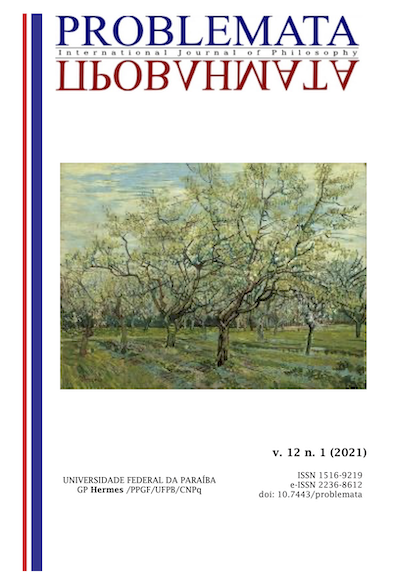CULTURAL FETISHISM IN TH. W. ADORNO:
CONTRIBUTIONS BY FREUD AND MARX
DOI:
https://doi.org/10.7443/problemata.v12i1.57332Keywords:
Theodor Adorno, Fetishism, Karl Marx, Sigmund FreudAbstract
The objective of the text is to analyze the concept of cultural fetishism proposed by Theodor Adorno, starting from its most striking theoretical origins: Freud, when analyzing the structure of the psyche of individuals, and Marx, when demonstrating the weight of social objectivity on the subjective constitution. We seek to elucidate the foundations of cultural fetishism and its forms of domination in the totalitarianism of the production and reception of commodities, supported by the imposing force of the cultural industry and the infantilization of the psyche. Finally, we emphasize Adorno’s proposals for an emancipation of art, especially music, with a view to expanding the subjective critical capacity.
Downloads
References
ADORNO, Theodor W. “O caráter fetichista da música e a regressão da audição”. Os pensadores. São Paulo: Nova Cultural, 2000.
ADORNO, Theodor Wiesengrund & HORKHEIMER, M. Dialética do Esclarecimento. Rio de Janeiro: Jorge Zahar, 2006.
COOK, D. Theodor Adorno: key concepts. Acumen Publishing Limited, 2008.
DUARTE, R. Teoria crítica da indústria cultural. Belo Horizonte: UFMG, 2003.
FREITAS, V. “Fetichismo e regressão musicais em Theodor Adorno”. Pensando — Revista de Filosofia, v. 8, n. 16, p.80-106, 2017.
FREUD, S. “On the genesis of fetishism”. The psychoanalityc quartely, n.57, p.147-156, 1988.
FREUD, S. “A divisão do ego no processo de defesa (1938)”. In: Obras psicológicas completas de Sigmund Freud: edição standard brasileira. Rio de Janeiro: Imago, 1996.
FREUD, S. Obras Completas, volume 17: Inibição, sintoma e angústia, O futuro de uma ilusão e outros textos (1926-1929). 1ª ed. São Paulo: Companhia das Letras, 2014.
FREUD, S. Obras Completas, volume 6: Três Ensaios sobre a teoria da sexualidade, Análise fragmentária de uma histeria (“O caso Dora”), e outros textos (1901-1905). 1ª ed. São Paulo: Companhia das Letras, 2016.
GUNSTER, S. “Revisiting the culture industry thesis: mass culture and the commodity form”. Cultural Critique, n. 45, p.40-70, 2000.
HARVEY, D. Para entender O capital: Livro I. São Paulo: Boitempo Editorial, 2013.
JAPPE, A. “Alienação, reificação e fetichismo da mercadoria”. Limiar, v.1, n.2, p.4-29, 2014.
LAPLANCHE, J; PONTALIS, J. B. Vocabulário da Psicanálise. São Paulo: Martins Fontes, 1996.
MARX, K. O Capital: Livro I. São Paulo: Boitempo Editorial, 2017.
RUBIN, I. I. A teoria marxista do valor. Editora Polis, 1987.
SAFATLE, V. “Fetichismo e mímesis na filosofia da música adorniana”. Discurso, n. 37, p. 365-406, 2007.
SAFATLE, V. “Adorno e a crítica da cultura como estratégia da crítica da razão”. Revista Artefilosofia, Ouro Preto, n. 7, p. 21-30, 2009.
SAFATLE, V. Fetichismo: Colonizar o Outro. 2ª ed. Rio de Janeiro: Civilização Brasileira, 2015.
SAFATLE, V.; SILVA JUNIOR, N.; DUNKER, C. (orgs.). Patologias do social: arqueologias do sofrimento psíquico. Belo Horizonte: Autêntica Editora, 2018.
SILVA, F. C. “Uma interpretação da obra O fetichismo na música e a regressão da audição de T. W. Adorno”. Revista Lampejo, n. 10, p. 137-164, 2016.
STALYBRASS, P. O casaco de Marx: roupas, memória, dor. Belo Horizonte: Autêntica, 2012.
WITKIN, R. W. Adorno on music. London; New York: Routledge, 1998.
WITKIN, R. W. Adorno on Popular Culture. London; New York: Routledge, 2003.
Downloads
Published
Issue
Section
License
Copyright (c) 2021 Luciana Neiva, Verlaine Freitas

This work is licensed under a Creative Commons Attribution 4.0 International License.
Authors who publish with this journal agree to the following terms:
- Authors retain copyright and grant the journal right of first publication with the work simultaneously licensed under a Creative Commons Attribution License that allows others to share the work with an acknowledgement of the work's authorship and initial publication in this journal.
- Authors are able to enter into separate, additional contractual arrangements for the non-exclusive distribution of the journal's published version of the work (e.g., post it to an institutional repository or publish it in a book), with an acknowledgement of its initial publication in this journal.
-
- Authors are permitted and encouraged to post their work online (e.g., in institutional repositories or on their website) prior to and during the submission process, as it can lead to productive exchanges, as well as earlier and greater citation of published work (See The Effect of Open Access).





